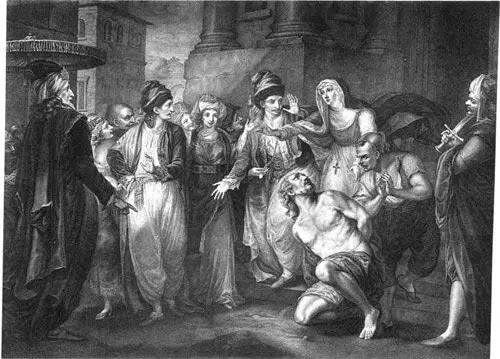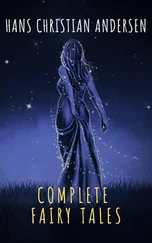Duke Menaphon, your most renowned uncle.
Adr.
Which of you two did dine with me to-day?
S. Ant.
I, gentle mistress.
Adr.
And are not you my husband?
E. Ant.
No, I say nay to that.
S. Ant.
And so do I, yet did she call me so;
And this fair gentlewoman, her sister here,
Did call me brother.
[To Luciana.]
What I told you then
I hope I shall have leisure to make good,
If this be not a dream I see and hear.
Ang.
That is the chain, sir, which you had of me.
S. Ant.
I think it be, sir, I deny it not.
E. Ant.
And you, sir, for this chain arrested me.
Ang.
I think I did, sir, I deny it not.
Adr.
I sent you money, sir, to be your bail,
By Dromio, but I think he brought it not.
E. Dro.
No, none by me.
S. Ant.
This purse of ducats I receiv’d from you,
And Dromio my man did bring them me.
I see we still did meet each other’s man,
And I was ta’en for him, and he for me,
And thereupon these errors are arose.
E. Ant.
These ducats pawn I for my father here.
Duke.
It shall not need, thy father hath his life.
Cour.
Sir, I must have that diamond from you.
E. Ant.
There take it, and much thanks for my good cheer.
Abb.
Renowned Duke, vouchsafe to take the pains
To go with us into the abbey here,
And hear at large discoursed all our fortunes;
And all that are assembled in this place
That by this sympathized one day’s error
Have suffer’d wrong, go keep us company,
And we shall make full satisfaction.
Thirty-three years have I but gone in travail
Of you, my sons, and till this present hour
My heavy burthen [ne’er] delivered.
The Duke, my husband, and my children both,
And you the calendars of their nativity,
Go to a gossips’ feast, and go with me—
After so long grief, such nativity!
Duke.
With all my heart, I’ll gossip at this feast.
Exeunt omnes. Manent the two Dromios and two brothers.
S. Dro.
Master, shall I fetch your stuff from shipboard?
E. Ant.
Dromio, what stuff of mine hast thou embark’d?
S. Dro.
Your goods that lay at host, sir, in the Centaur.
S. Ant.
He speaks to me. I am your master, Dromio.
Come go with us, we’ll look to that anon.
Embrace thy brother there, rejoice with him.
Exit [with Antipholus of Ephesus].
S. Dro.
There is a fat friend at your master’s house,
That kitchen’d me for you to-day at dinner:
She now shall be my sister, not my wife.
E. Dro.
Methinks you are my glass, and not my brother:
I see by you I am a sweet-fac’d youth.
Will you walk in to see their gossiping?
S. Dro.
Not I, sir, you are my elder.
E. Dro.
That’s a question; how shall we try it?
S. Dro.
We’ll draw cuts for the senior, till then, lead thou first.
E. Dro.
Nay then thus:
We came into the world like brother and brother;
And now let’s go hand in hand, not one before another.
Exeunt.
¶
 John Francis Rigaud , p. — Charles Gauthier Playter , e.
John Francis Rigaud , p. — Charles Gauthier Playter , e.
William Shakespeare
( 1593–1594 )
First Folio, 1623
taming
¶
Induction
Sc. I Sc. II
Act I
Sc. I Sc. II
Act II
Sc. I
Act III
Sc. I Sc. II
Act IV
Sc. I Sc. II Sc. III Sc. IV Sc. V
Act V
Sc. I Sc. II
[Dramatis Personae
Lord
Christopher Sly , a tinker
Hostess , Page, Players, Huntsmen, and Servants
Baptista , a rich gentleman of Padua
Vincentio , an old gentleman of Pisa
Lucentio , son to Vincentio, in love with Bianca
Petruchio , a gentleman of Verona, suitor to Katherina
–––––
Gremio ,
Hortensio , suitors to Bianca
Tranio ,
Biondello , servants to Lucentio
Grumio ,
Curtis , servants to Petruchio
Pedant
Katherina , the shrew,
Bianca ,
Widow , daughters to Baptista
Tailor , Haberdasher, and Servants attending on Baptista and Petruchio
Scene: Padua , and Petruchio’s country house]
Enter beggar, Christophero Sly, and Hostess.
Sly. I’ll pheeze you, in faith.
Host. A pair of stocks, you rogue!
Sly. Y’ are a baggage, the Slys are no rogues. Look in the chronicles; we came in with Richard Conqueror. Therefore paucas pallabris, let the world slide. Sessa!
Host. You will not pay for the glasses you have burst?
Sly. No, not a denier. Go by, Saint Jeronimy! go to thy cold bed, and warm thee.
Host. I know my remedy; I must go fetch the [thirdborough].
Exit.
Sly. Third, or fourth, or fift borough, I’ll answer him by law. I’ll not budge an inch, boy; let him come, and kindly.
Falls asleep.
Wind horns. Enter a Lord from hunting, with his
Train.
Lord.
Huntsman, I charge thee, tender well my hounds
(Brach Merriman, the poor cur, is emboss’d),
And couple Clowder with the deep-mouth’d brach.
Saw’st thou not, boy, how Silver made it good
At the hedge-corner, in the coldest fault?
I would not lose the dog for twenty pound.
[1.] Hun.
Why, Belman is as good as he, my lord;
He cried upon it at the merest loss,
And twice to-day pick’d out the dullest scent.
Trust me, I take him for the better dog.
Lord.
Thou art a fool; if Echo were as fleet,
I would esteem him worth a dozen such.
But sup them well, and look unto them all,
To-morrow I intend to hunt again.
[1.] Hun.
I will, my lord.
Lord.
What’s here? One dead, or drunk? See, doth he breathe?
2. Hun.
He breathes, my lord. Were he not warm’d with ale,
This were a bed but cold to sleep so soundly.
Lord.
O monstrous beast, how like a swine he lies!
Grim death, how foul and loathsome is thine image!
Sirs, I will practice on this drunken man.
What think you, if he were convey’d to bed,
Wrapp’d in sweet clothes, rings put upon his fingers,
A most delicious banquet by his bed,
And brave attendants near him when he wakes,
Would not the beggar then forget himself?
1. Hun.
Believe me, lord, I think he cannot choose.
2. Hun.
It would seem strange unto him when he wak’d.
Lord.
Even as a flatt’ring dream or worthless fancy.
Then take him up, and manage well the jest.
Carry him gently to my fairest chamber,
And hang it round with all my wanton pictures.
Balm his foul head in warm distilled waters,
And burn sweet wood to make the lodging sweet.
Procure me music ready when he wakes,
Читать дальше

 John Francis Rigaud , p. — Charles Gauthier Playter , e.
John Francis Rigaud , p. — Charles Gauthier Playter , e.










